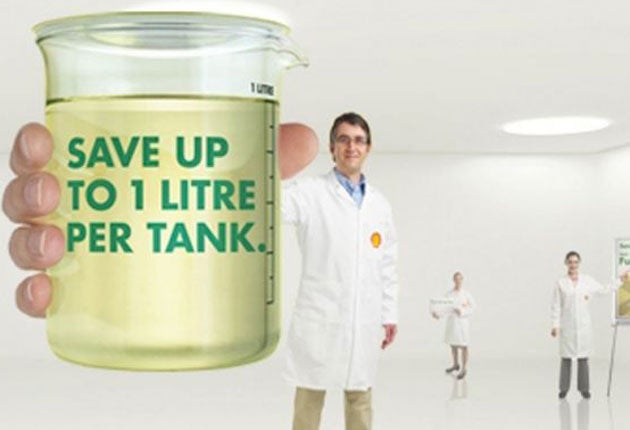Your support helps us to tell the story
From reproductive rights to climate change to Big Tech, The Independent is on the ground when the story is developing. Whether it's investigating the financials of Elon Musk's pro-Trump PAC or producing our latest documentary, 'The A Word', which shines a light on the American women fighting for reproductive rights, we know how important it is to parse out the facts from the messaging.
At such a critical moment in US history, we need reporters on the ground. Your donation allows us to keep sending journalists to speak to both sides of the story.
The Independent is trusted by Americans across the entire political spectrum. And unlike many other quality news outlets, we choose not to lock Americans out of our reporting and analysis with paywalls. We believe quality journalism should be available to everyone, paid for by those who can afford it.
Your support makes all the difference.The advertisements feature the kind of enthusiastic boffins who only seem to exist in car commercials, wearing pristine white coats to jack up a hatchback, whirl its wheels and measure its engine's efficiency. "Our scientists carry out extensive testing to improve our fuels," intones a fluid voice.
Shell has big claims for its latest fuel, FuelSave. The company asserts that by including a series of mysterious magic ingredients in its fuel it can now propel an average car the same distance as other fuels, but use a litre less juice. This avoids the pollution of 2kg of carbon dioxide every time you top up your tank (for comparison, the average Briton's annual carbon footprint is around 10 tonnes). Shell says it is supporting the targets of the International Energy Agency – a consortium of different governments' policy-makers – who have a target of a £700bn to be invested in energy technology worldwide over the next 20 years. But how does FuelSave work and is it really that good?
The exact details of the fuel's composition are a closely-guarded secret (Shell says it would compromise its "commercial confidentiality" if it divulged this information). What we do know is that there are three different types of the new fuel. Each will replace currently-available regular unleaded, diesel and diesel "extra" brands available at Shell garages across the country.
So, how does it work? Well, most diesel cars' engines are around 30 per cent efficient, meaning just less than a third of the energy sparked by burning the fuel drives the vehicle. In most present-day engines fuel is atomised – turned into a spray – at the place in the engine where it is mixed with air, but this component, the injector, often becomes clogged up. Shell's existing diesel already contains a detergent to help prevent dirty injectors; the new fuel also contains an "efficiency" improver which speeds up fuel ignition – essentially how quickly the fuel combusts – in the same place. "Shell FuelSave Diesel is the result of extensive research programmes to get the most out of every drop," says a Shell spokesperson. So far, so good.
Meanwhile, unleaded petrol engines are even more inefficient than diesel (that's the reason that petrol cars warm up quicker than diesel ones – they are wasting more energy). In this case, just 20 to 25 per cent of the petrol energy gets turned into motion. For their new unleaded product, Shell's scientists focused on lubrication, discovering that an engine's pistons are often inconsistently covered in oil, resulting in greater friction. Shell's new unleaded formula contains a "lubrication agent" that coats the top of pistons when fuel is injected into the nearby cylinders. Or as Shell puts it: "The detergent additive controls inlet system deposits by keeping inlet valves clean and preventing deposits from forming."
While independent consumer testing is still in its early stages, environmentalists are predictably cynical about the benefits of the move. "The thing is, if you really want to save fuel, then don't get in a car," says Charlie Kronick, senior climate advisor for Greenpeace UK. "Or take extra weight out of the boot, take off the roof rack, inflate your tyres and all will probably give you the same benefit as a fuel-efficiency system without putting money in Shell's pocket. At the end of the day, society just has to use less oil. Shell are doing better marketing; lubrication improves the efficiency of your car but that's about it."
It's a sentiment echoed by Friends of the Earth, which is pushing for 40 per cent cuts in carbon dioxide emissions by 2020. "Technical advances that make cars more fuel efficient will help to cut emissions, but these alone will not deliver the emissions cuts we need from transport," says Tony Bosworth, a senior climate campaigner at Friends of the Earth. "The Government must encourage drivers to use greener alternatives to the car – walking, cycling or public transport – to reduce emissions, cut congestion and improve our local areas."
There are, of course, non-petrol-related ways that you can reduce your car's fuel consumption. Shell recommends turning off your engine when dawdling in traffic. A dirty engine in the form of worn-out spark plugs can reduce your efficiency by 5 per cent and boy racers, especially, should take heed: revving your motor can expend unnecessary fuel. Lastly, using your car manufacturer's recommended motor oil (sounds obvious, doesn't it?) can improve fuel economy by another 1 or 2 per cent. Get economising, with or without the bigwigs' blessing.

Join our commenting forum
Join thought-provoking conversations, follow other Independent readers and see their replies
Comments